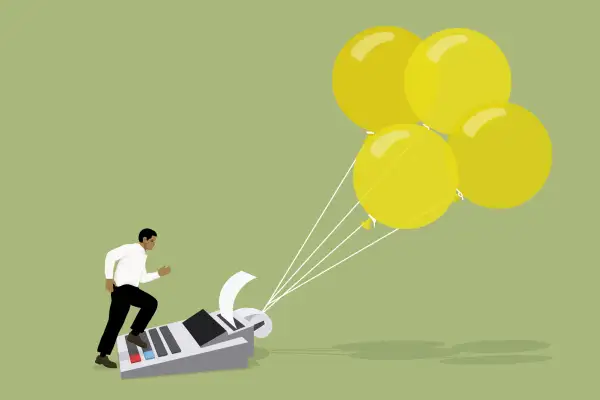As Prices Spike, Here's Why You Need to Calculate Your 'Personal Inflation Rate'

If you read the headlines, you've probably seen a lot of people fret that inflation is a big problem for the U.S. economy right now. But will it actually end up being a big problem for you? The truth is, it all depends on what you spend your money on.
The Consumer Price Index, a basket of thousands of goods and services, jumped 5.4% in September from a year ago, according to the Bureau of Labor Statistics. It's one of the highest rates the country has seen in more than a decade. But that official measure of inflation, based on economists' rough guesses about what most Americans buy each month, could be very different from the unofficial inflation that you yourself are experiencing.
This means if you want to know how much to worry about rising prices, and perhaps whether to budget for them, you need to calculate your own personal rate of inflation beyond what you see talked about in newspapers and cable TV.
What is inflation?
It's tempting to think of inflation as a shrinking dollar bill, as if today's inflation rate meant each $1 in your wallet would be worth 95 cents the next time you walk into a store. But the so-called headline rate is really just a one size-fits-all average that can disguise the fact that prices for some goods are ballooning dramatically, while prices for others may be static or even falling. Whether inflation ends up taking a chomp or just a nibble from your budget depends on what your expenses are.
“A good example right now is energy prices, which are among the biggest catalysts for inflation,” says Christine Benz, the director of personal finance for Morningstar. “If you’re not driving, you’re not directly impacted by higher fuel costs for a car.”
Of course, a non-driver may still be affected indirectly by higher fuel costs because it could cost more to take public transportation, hail a cab or transport items to stores. But the pain of paying more money to fill up your tank at the gas pump — where prices are up a whopping 42% in the past year, according to the latest CPI report — won’t be felt equally by drivers and non-drivers alike.
Other items that also saw significant year-over-year jumps last month: Used vehicles (24%), food (4.6%), and daycare (2.4%). While the cost of drugs and medical devices actually fell by 1.6%.
Age is a significant reason why getting a "personal" rate of inflation matters, Benz notes. Medical costs typically affect older Americans more than childcare costs, for example. "It's important to think about your own spending patterns and where you are in life."
Calculating a personal inflation rate
The Bureau of Labor Statistics collects pricing data for thousands of goods and services, then assigns a weighting to broad categories to calculate the CPI. This is meant to mirror a typical household budget, with housing constituting a higher weighting in the index than apparel, for example.
While the BLS has long created separate indexes for various cities or regions of the country, those adjustments still overlook the fact that not all household budgets look alike.
To calculate your personal inflation rate, Benz recommends analyzing how your annual spending can be divided between eight broad categories — food, housing, apparel, transportation, medical care, recreation and leisure, education and communication, and other goods. (It may help if you already use a budgeting app like Mint or if your credit card categorizes expenses for you.) With that information, you can then input your spending for each category into this worksheet created by Benz and her colleagues at Morningstar, and update the current inflation rates for each category with the latest data from the Bureau of Labor Statistics.
This personalized inflation rate will help you to understand how inflation impacts both your spending and your savings, Benz says. While inflation will eat into any money that you have in a savings account, your investments may not take much of a hit. That’s because stocks historically have outperformed the rate of inflation, she adds.
Inflation isn’t inherently harmful
While Federal Reserve policymakers had been saying for months that inflation would be “transitory,” that’s looking increasingly less likely. Even though Americans haven’t had to worry about inflation in a long time, it’s not necessarily all bad.
“I tend to push back on the notion that inflation is something that you don’t get a break on, and it’s an inexorable force,” Benz says. For example, she points to the recent announcement that Social Security recipients will receive the biggest cost-of-living adjustment (COLA) to their benefits in 40 years, and workers have more leverage in negotiating a raise in salary now than they have in years.
Meanwhile, homeowners tend to be insulated from rising home prices — which has been happening since the Covid-19 pandemic — which can be helpful since housing is a big-ticket budget item for most households, Benz notes.
“There are some forces at play in the economy that attempt to make you whole for some of the higher prices you’re paying,” Benz says.
More from Money:
Robinhood for Beginners: A Complete Guide to Investing With the Controversial Stocks App
(An earlier version of this story failed to state Christine Benz's full name and title.)